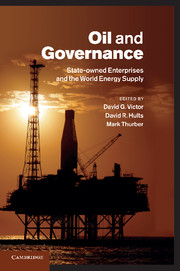Book contents
- Frontmatter
- Contents
- Figures
- Tables
- Boxes
- Contributors
- Acknowledgements
- Part I Introduction
- Part II Thematic studies of national oil companies
- Part III National oil company case studies
- 5 Saudi Aramco: the jewel in the crown
- 6 Oil, monarchy, revolution, and theocracy: a study on the National Iranian Oil Company (NIOC)
- 7 Handcuffed: an assessment of Pemex’s performance and strategy
- 8 Kuwait Petroleum Corporation (KPC): an enterprise in gridlock
- 9 China National Petroleum Corporation (CNPC): a balancing act between enterprise and government
- 10 Petróleos de Venezuela, S.A. (PDVSA): from independence to subservience
- 11 Awakening giant: strategy and performance of the Abu Dhabi National Oil Company (ADNOC)
- 12 Brazil’s Petrobras: strategy and performance
- 13 Sonatrach: the political economy of an Algerian state institution
- 14 Norway’s evolving champion: Statoil and the politics of state enterprise
- 15 Gazprom: the struggle for power
- 16 NNPC and Nigeria’s oil patronage ecosystem
- 17 Fading star: explaining the evolution of India’s ONGC
- 18 Petronas: reconciling tensions between company and state
- 19 Angola’s Sonangol: dexterous right hand of the state
- Part IV Conclusions and implications
- Part V Appendices
- References
- Index
9 - China National Petroleum Corporation (CNPC): a balancing act between enterprise and government
Published online by Cambridge University Press: 05 January 2012
- Frontmatter
- Contents
- Figures
- Tables
- Boxes
- Contributors
- Acknowledgements
- Part I Introduction
- Part II Thematic studies of national oil companies
- Part III National oil company case studies
- 5 Saudi Aramco: the jewel in the crown
- 6 Oil, monarchy, revolution, and theocracy: a study on the National Iranian Oil Company (NIOC)
- 7 Handcuffed: an assessment of Pemex’s performance and strategy
- 8 Kuwait Petroleum Corporation (KPC): an enterprise in gridlock
- 9 China National Petroleum Corporation (CNPC): a balancing act between enterprise and government
- 10 Petróleos de Venezuela, S.A. (PDVSA): from independence to subservience
- 11 Awakening giant: strategy and performance of the Abu Dhabi National Oil Company (ADNOC)
- 12 Brazil’s Petrobras: strategy and performance
- 13 Sonatrach: the political economy of an Algerian state institution
- 14 Norway’s evolving champion: Statoil and the politics of state enterprise
- 15 Gazprom: the struggle for power
- 16 NNPC and Nigeria’s oil patronage ecosystem
- 17 Fading star: explaining the evolution of India’s ONGC
- 18 Petronas: reconciling tensions between company and state
- 19 Angola’s Sonangol: dexterous right hand of the state
- Part IV Conclusions and implications
- Part V Appendices
- References
- Index
Summary
Introduction
National oil companies (NOCs) are pivotal to the global oil market. They control nearly 90 percent of the world’s crude oil reserves and account for two-thirds of the world’s crude oil production (EIA 2009b). China’s NOCs are especially important due to the role the country plays as a major consumer of oil, but also as an increasingly visible investor in oil producing projects around the world. A previous paper by the Baker Institute at Rice University (S. Lewis 2007) analyzed the Chinese oil industry as a whole, and others (Jakobson and Zha 2006; Ma and Andrews-Speed 2006; Taylor 2006; Downs 2007a, 2007b; Xu 2007) have focused on the overseas activities of the Chinese NOCs. The following study, however, will concentrate on the largest and most important of China’s NOCs: China National Petroleum Corporation (CNPC). CNPC has been the central element of the Chinese government’s efforts to manage its growing dependence on oil and natural gas, which are essential to China’s economy yet China has neither fuel in abundance.
CNPC is often portrayed in extremes. While many Western observers see it as a puppet of the state that schemes to hoard energy resources abroad, the Chinese government has been persistent in characterizing the firm as a transparent and internationalized oil company. The real picture of CNPC is, of course, much more complicated. Its relationship with the state, its financial performance, and the non-financial aspects of its operations are the result of more than five decades of political upheaval, social change, and economic reforms since the ascent of one-party rule in China. As a result, CNPC is an entity of contradictions and inconsistencies. It is a victim of China’s incomplete transition between a planned economy and a free market economy as well as a driver of economic change. It is a forward-thinking and technologically advanced enterprise and one that lacks transparency and accountability in its actions.
- Type
- Chapter
- Information
- Oil and GovernanceState-Owned Enterprises and the World Energy Supply, pp. 379 - 417Publisher: Cambridge University PressPrint publication year: 2011
- 3
- Cited by



